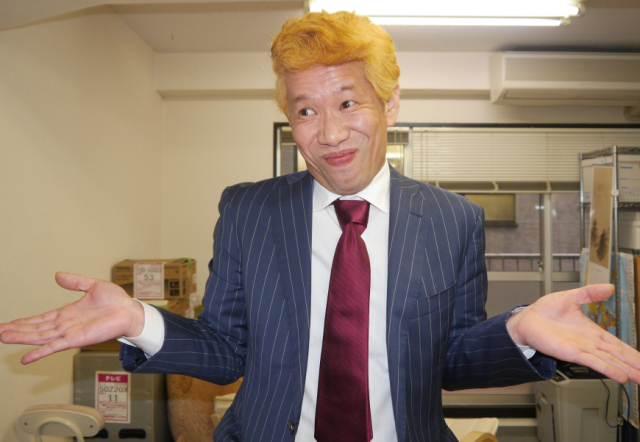
A source at the Ministry of Foreign Affairs says they’ll be stepping in to help PM Suga in future.
Japanese can be an incredibly hard language for English speakers to master, with sentences turned back to front, the need to adjust words for politeness and direct translations into the language sometimes making no sense at all.
By the same token, it’s equally difficult for Japanese speakers to master English, no matter how experienced you are or how many people you have on hand to assist you. That was made abundantly clear this month, when Japan’s newly inaugurated Prime Minister, Yoshihide Suga, sent out a public tweet to Donald Trump and “Madam First Lady” following their positive test result for COVID-19.
Dear President Trump,
— 菅 義偉 (@sugawitter) October 2, 2020
I was very worried about you when I read your tweet saying that you and Madam First Lady tested positive for COVID-19. I sincerely pray for your early recovery and hope that you and Madam First Lady will return to normal life soon. https://t.co/KcZHxqzhNg
There’s nothing glaringly wrong with Suga’s tweet as a whole — we’ve seen many worse examples of Engrish before — but for a world leader, many people expected much better. While a lot of native English speakers didn’t have any major issues with what was written, other than the incorrect use of “Madam First Lady”, it was widely criticised by Japanese speakers of English, who left comments like:
“‘I was worried’ suggests you were worried before but you’re not worried anymore.”
“The ‘was’ part is fine here — it’s what comes after it that sounds stiff. Everything from ‘I sincerely’ is okay as well.”
“Did they use auto-translate for this?”
“I’m embarrassed.”
“It reads like something a junior high school student would write.”
“This isn’t Suga’s fault – he should have people checking these things for him.”
This criticism of the tweet didn’t just come from the Japanese public — it also came from Suga’s own Liberal Democratic Party (LDP). Government sources say members at the LDP’s Diplomacy Section meeting on 7 October shared frank opinions about the tweet, complaining that the level of English was “too low”.
A Diet member at the meeting pointed out that “I was worried” can be “taken to mean that I am not worried now.” The tweet was also criticised for sounding too much like a machine-generated translation.
This preoccupation with the past tense of “worry” makes it sound as if the blind is leading the blind in Suga’s office, as the tense isn’t something a native speaker would really take issue with. If anything, it’s the tone created by “about you” that’s more of an issue, as “I was very worried about you when I read your tweet” sounds like something your mum would say if you tweeted about not brushing your teeth for a week.
What’s even more puzzling is the fact that Suga’s English-language tweet was followed by a Japanese version two minutes later, and its literal translation reads far more smoothly in English.
親愛なるトランプ大統領へ、
— 菅 義偉 (@sugawitter) October 2, 2020
貴大統領とメラニア夫人がコロナに感染したとのツイートを見て心配しましたが、お二人が速やかにコロナを克服し、日常を取り戻すことを祈っています。
The literal translation of the Japanese version above is as follows:
“Dear President Trump, I was worried when I saw the tweet saying the President and First Lady Melania had contracted corona, but I pray you both quickly overcome corona and get back to your daily lives.”
So which one is better — the literal translation above or the English version below?
“Dear President Trump, I was very worried about you when I read your tweet saying that you and Madam First Lady tested positive for COVID-19. I sincerely pray for your early recovery and hope that you and Madam First Lady will return to normal life soon.”
It’s unknown which version came first in the Prime Minister’s office, but it’s more than likely the message in Suga’s native language of Japanese was approved first. That means somebody decided to add a “very“, an “about you“, a “Madam“, and a “sincerely” to the English message while taking creative liberties to read “saw the tweet” as “read your tweet“, “corona” as “COVID-19” and “quickly overcome” as “early recovery“.
These points suggest that no native English speakers were consulted before Suga’s English-language tweet was approved. Either that or the translation went through non-native-speaker higher-ups for approval, where keywords like “Madam” were deemed essential.
Either way, while the English tweet has a certain Japanese charm of its own, a source at the Ministry of Foreign Affairs says they will be responding to the problem by forming a support system for the Prime Minister.
Hopefully this support system will help to avoid any problems in future, and if they’re looking for tips on how to send out a tweet with the appropriate tone and voice of a world leader, they might want to avoid taking cues from the Twitter account of President Trump. Because then there are no rules when it comes to anything, let alone the proper use of English.
Source: Kyodo via Ceron
Top image ©SoraNews24
● Want to hear about SoraNews24’s latest articles as soon as they’re published? Follow us on Facebook and Twitter!

 What do Japanese netizens think about President Trump’s “I remember Pearl Harbor” comment?
What do Japanese netizens think about President Trump’s “I remember Pearl Harbor” comment? Japan’s Prime Minister says he didn’t want to cosplay as Mario at the 2016 Olympics
Japan’s Prime Minister says he didn’t want to cosplay as Mario at the 2016 Olympics Japanese politician posts photo of his dinner, netizens pity him over his depression meal
Japanese politician posts photo of his dinner, netizens pity him over his depression meal Japanese elementary school student teaches us all how to pronounce English like a native speaker
Japanese elementary school student teaches us all how to pronounce English like a native speaker Japanese TV broadcaster captions Donald Trump’s sumo speech in Tokyo as just “English”
Japanese TV broadcaster captions Donald Trump’s sumo speech in Tokyo as just “English” McDonald’s new Happy Meals offer up cute and practical Sanrio lifestyle goods
McDonald’s new Happy Meals offer up cute and practical Sanrio lifestyle goods All-you-can-drink Starbucks and amazing views part of Tokyo’s new 170 meter-high sky lounge
All-you-can-drink Starbucks and amazing views part of Tokyo’s new 170 meter-high sky lounge More foreign tourists than ever before in history visited Japan last month
More foreign tourists than ever before in history visited Japan last month Beautiful Sailor Moon manhole cover coasters being given out for free by Tokyo tourist center
Beautiful Sailor Moon manhole cover coasters being given out for free by Tokyo tourist center Arrest proves a common Japanese saying about apologies and police
Arrest proves a common Japanese saying about apologies and police Tokyo luxury hotel offers month-long stays with free breakfasts, might be cheaper than apartment
Tokyo luxury hotel offers month-long stays with free breakfasts, might be cheaper than apartment The oldest tunnel in Japan is believed to be haunted, and strange things happen when we go there
The oldest tunnel in Japan is believed to be haunted, and strange things happen when we go there Tokyo Station’s perfect breakfast spot might just be this izakaya Japanese-style pub
Tokyo Station’s perfect breakfast spot might just be this izakaya Japanese-style pub Hello Kitty isn’t a cat!? We called Sanrio to find out!
Hello Kitty isn’t a cat!? We called Sanrio to find out! Chowing down on dirt-cheap gyoza and insane portions at Fukuoka’s Gyoza Supermarket Pub
Chowing down on dirt-cheap gyoza and insane portions at Fukuoka’s Gyoza Supermarket Pub Disney princesses get official manga makeovers for Manga Princess Cafe opening in Tokyo
Disney princesses get official manga makeovers for Manga Princess Cafe opening in Tokyo We try out “Chan Ramen”, an underground type of ramen popular in the ramen community
We try out “Chan Ramen”, an underground type of ramen popular in the ramen community Starbucks reopens at Shibuya Scramble Crossing with new look and design concept
Starbucks reopens at Shibuya Scramble Crossing with new look and design concept Beautiful new Final Fantasy T-shirt collection on the way from Uniqlo【Photos】
Beautiful new Final Fantasy T-shirt collection on the way from Uniqlo【Photos】 Foreign English teachers in Japan pick their favorite Japanese-language phrases【Survey】
Foreign English teachers in Japan pick their favorite Japanese-language phrases【Survey】 Is the new Shinkansen Train Desk ticket worth it?
Is the new Shinkansen Train Desk ticket worth it? There’s a park inside Japan where you can also see Japan inside the park
There’s a park inside Japan where you can also see Japan inside the park Japanese convenience store packs a whole bento into an onigiri rice ball
Japanese convenience store packs a whole bento into an onigiri rice ball Studio Ghibli releases Kiki’s Delivery Service chocolate cake pouches in Japan
Studio Ghibli releases Kiki’s Delivery Service chocolate cake pouches in Japan Japan’s bone-breaking and record-breaking roller coaster is permanently shutting down
Japan’s bone-breaking and record-breaking roller coaster is permanently shutting down New definition of “Japanese whiskey” goes into effect to prevent fakes from fooling overseas buyers
New definition of “Japanese whiskey” goes into effect to prevent fakes from fooling overseas buyers Foreign passenger shoves conductor on one of the last full runs for Japan’s Thunderbird train
Foreign passenger shoves conductor on one of the last full runs for Japan’s Thunderbird train Our Japanese reporter visits Costco in the U.S., finds super American and very Japanese things
Our Japanese reporter visits Costco in the U.S., finds super American and very Japanese things Kyoto bans tourists from geisha alleys in Gion, with fines for those who don’t follow rules
Kyoto bans tourists from geisha alleys in Gion, with fines for those who don’t follow rules Studio Ghibli unveils Mother’s Day gift set that captures the love in My Neighbour Totoro
Studio Ghibli unveils Mother’s Day gift set that captures the love in My Neighbour Totoro Domino’s Japan now sells…pizza ears?
Domino’s Japan now sells…pizza ears? New Japanese KitKat flavour stars Sanrio characters, including Hello Kitty
New Japanese KitKat flavour stars Sanrio characters, including Hello Kitty Sales of Japan’s most convenient train ticket/shopping payment cards suspended indefinitely
Sales of Japan’s most convenient train ticket/shopping payment cards suspended indefinitely Sold-out Studio Ghibli desktop humidifiers are back so Totoro can help you through the dry season
Sold-out Studio Ghibli desktop humidifiers are back so Totoro can help you through the dry season Japanese government to make first change to romanization spelling rules since the 1950s
Japanese government to make first change to romanization spelling rules since the 1950s Ghibli founders Toshio Suzuki and Hayao Miyazaki contribute to Japanese whisky Totoro label design
Ghibli founders Toshio Suzuki and Hayao Miyazaki contribute to Japanese whisky Totoro label design Doraemon found buried at sea as scene from 1993 anime becomes real life【Photos】
Doraemon found buried at sea as scene from 1993 anime becomes real life【Photos】 Tokyo’s most famous Starbucks is closed
Tokyo’s most famous Starbucks is closed One Piece characters’ nationalities revealed, but fans have mixed opinions
One Piece characters’ nationalities revealed, but fans have mixed opinions We asked a Uniqlo employee what four things we should buy and their suggestions didn’t disappoint
We asked a Uniqlo employee what four things we should buy and their suggestions didn’t disappoint Princesses, fruits, and blacksmiths: Study reveals the 30 most unusual family names in Japan
Princesses, fruits, and blacksmiths: Study reveals the 30 most unusual family names in Japan Studio Ghibli’s new desktop Howl’s Moving Castle will take your stationery on an adventure
Studio Ghibli’s new desktop Howl’s Moving Castle will take your stationery on an adventure Is this common Japanese phrase for “goodbye” the reason for Japan’s crazy overtime hours?
Is this common Japanese phrase for “goodbye” the reason for Japan’s crazy overtime hours? Prime Minster Abe tells Trump that imperial succession is “100 times bigger” than the Super Bowl
Prime Minster Abe tells Trump that imperial succession is “100 times bigger” than the Super Bowl No good at saving money? You may have your mother tongue to blame for that
No good at saving money? You may have your mother tongue to blame for that Donald Trump meets Pen-Pineapple-Apple-Pen singer Piko Taro in Japan
Donald Trump meets Pen-Pineapple-Apple-Pen singer Piko Taro in Japan Adult Cream Pie coming to McDonald’s Japan
Adult Cream Pie coming to McDonald’s Japan Seven mistakes foreigners make when speaking Japanese—and how to fix them
Seven mistakes foreigners make when speaking Japanese—and how to fix them Eating Tokyo’s most expensive pancakes required us to go through a security check
Eating Tokyo’s most expensive pancakes required us to go through a security check Political commentator says Donald Trump supporters whack off to anime 【Video】
Political commentator says Donald Trump supporters whack off to anime 【Video】 Is Life Accordion to Trump the best video on the Internet? Japanese Twitter seems to think so!
Is Life Accordion to Trump the best video on the Internet? Japanese Twitter seems to think so! English conversation school in Japan has clever reminder that students don’t have to be perfect
English conversation school in Japan has clever reminder that students don’t have to be perfect Japanese student protesters announce “WE WILL STOP!!!!” in English on Twitter, get clowned for it
Japanese student protesters announce “WE WILL STOP!!!!” in English on Twitter, get clowned for it RocketNews24’s six top tips for learning Japanese
RocketNews24’s six top tips for learning Japanese Station lockers around Tokyo start closing from today due to upcoming Trump visit to Japan
Station lockers around Tokyo start closing from today due to upcoming Trump visit to Japan “We wasted so much time in English class” — Japanese Twitter user points out major teaching flaw
“We wasted so much time in English class” — Japanese Twitter user points out major teaching flaw
Leave a Reply